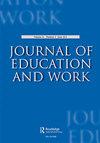永远快乐:理想在理发师职业教育和培训中得到复制和挑战
IF 1.7
Q2 EDUCATION & EDUCATIONAL RESEARCH
引用次数: 1
摘要
在美发行业中,情绪劳动往往使其他职业技能黯然失色。本研究使用民族志方法,探讨了瑞典理发师职业教育和培训(VET)的学生和教师如何描述和解释当理发师提供良好服务时所进行的情绪劳动。结果表明,在学生和职业教育教师对一个理想的服务工作者应该如何行动的描述中,看起来快乐和微笑占据了中心位置。积极的态度和特殊的声音是提供优质服务的理发师的其他特征。在美发师教育中,快乐的理想既是对学生的再现,也是对学生的挑战。一个结论是,一个理想的服务工作者会强化女性气质规范,表现得像一个专业人士,这符合理发师教育的要求,也符合客户和雇主的期望。与此同时,快乐的理想限制了学生挑战和质疑现行权力结构的机会,这也是瑞典高中使命的一部分。本文章由计算机程序翻译,如有差异,请以英文原文为准。
Always happy: an ideal is reproduced and challenged in hairdresser vocational education and training
ABSTRACT In the hairdressing occupation emotional labour has often come to overshadow other vocational skills. The present study, using ethnographic methods, explores how students and teachers in vocational education and training (VET) for hairdressers in Sweden describe and explain the emotional labour being carried out when a hairdresser perform good service. The results show that to look happy and smile has a central position in students’ and VET teachers’ descriptions of how an ideal service worker is expected to act. A positive attitude and a special voice are other signs that characterise the hairdresser who provides good service. The happy ideal is both reproduced and challenged from students in the hairdresser education. One conclusion is that an ideal service worker reinforces femininity norms to act as a professional, which is in line with the requirements of the hairdresser education and the customer’s and employers’ expectations. At the same time, the happy ideal limits students’ opportunities to challenge and question prevailing power structures, which is also part of the Swedish upper secondary school mission.
求助全文
通过发布文献求助,成功后即可免费获取论文全文。
去求助
来源期刊

Journal of Education and Work
EDUCATION & EDUCATIONAL RESEARCH-
CiteScore
2.70
自引率
14.30%
发文量
40
期刊介绍:
The Journal of Education and Work is an international forum for academic research and policy analysis which focuses on the interplay of the education and economic systems. The journal examines how knowledge, skills, values and attitudes both about and for work and employment are developed within the education system. The journal also explores the various forms of industrial training and accreditation in the economic system, including changes in the economic and industrial infrastructure which influence the type of employees required. Work in the informal economy is also included.
 求助内容:
求助内容: 应助结果提醒方式:
应助结果提醒方式:


